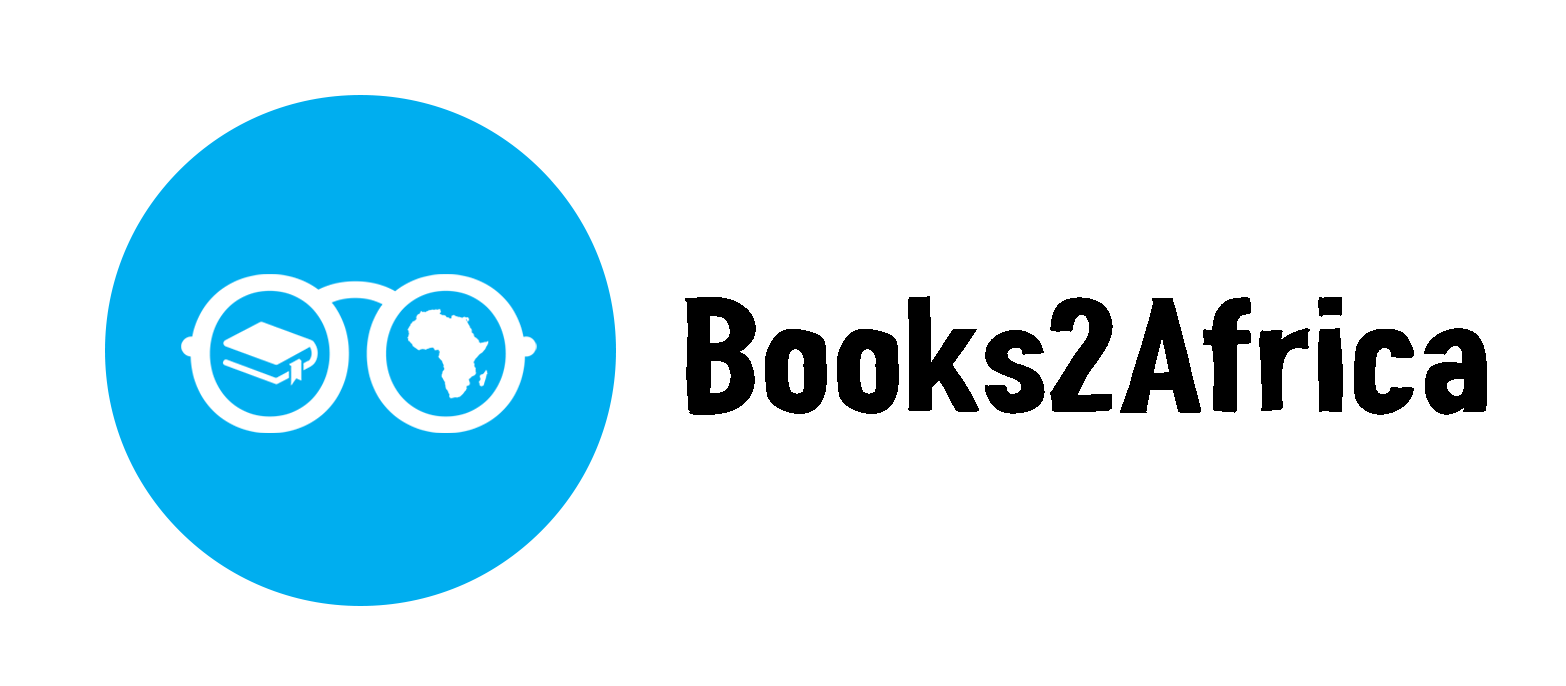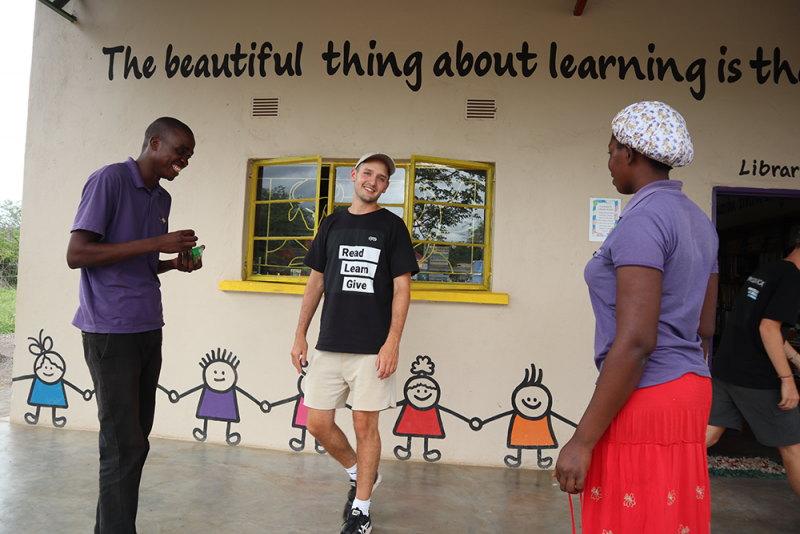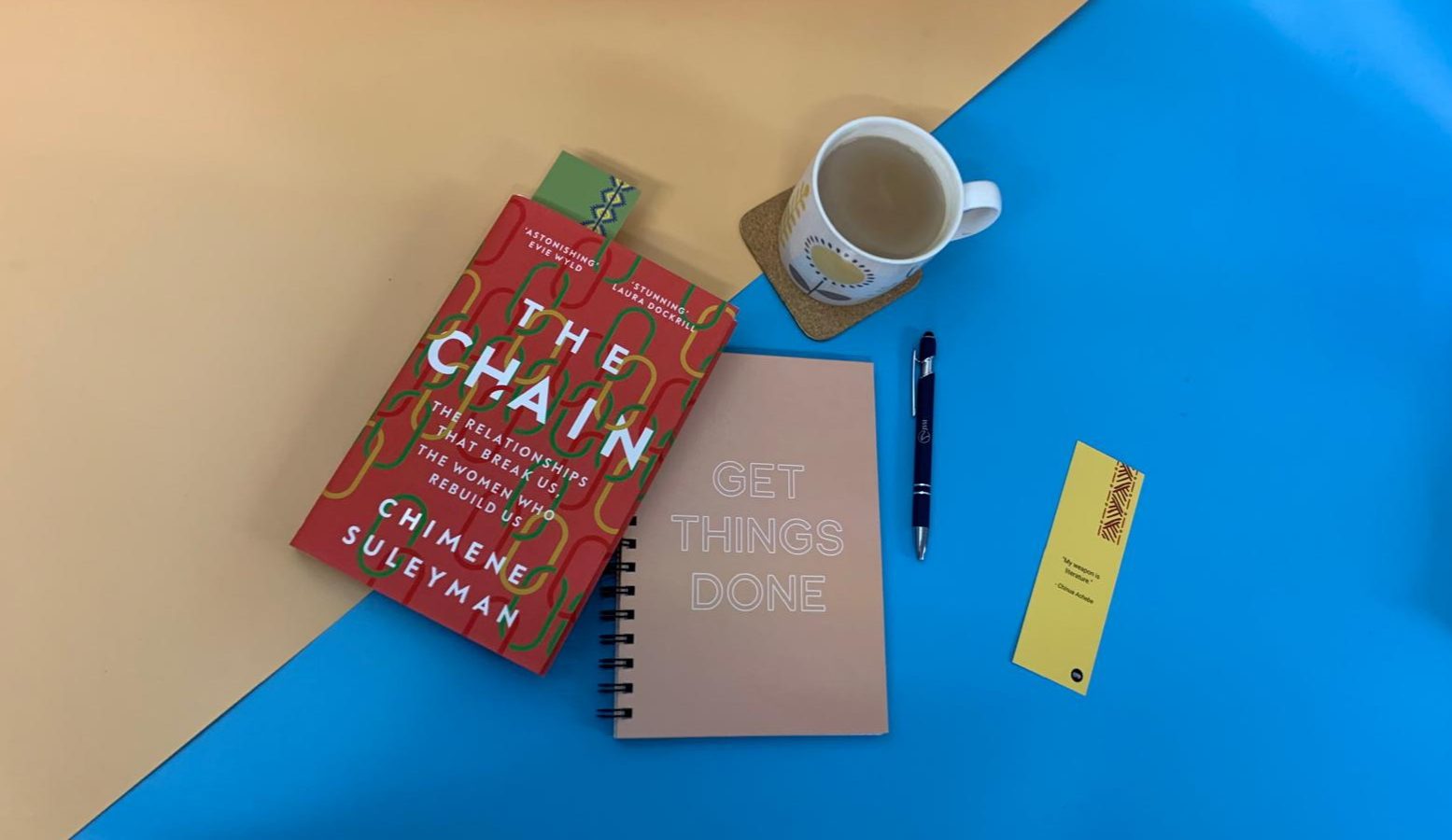Tukongote is a community project run by the Waterberry Lodge in southwest Zambia. Over the past 3 years, Waterberry have built three school buildings to serve the surrounding villages. Books2Africa (B2A) delivered 27,000 books to Tukongote Community Project in early 2018. In June, the community library was opened for use by Tukongote’s growing primary school, and adults and children from the local area. From that shipment Tukongote also redistributed some textbooks and learning materials to other local primary and secondary schools. Even in the relatively short period of distribution and usage, the effect of the books has been widely felt. The community has engaged with the resources at all levels: reading corners in Preschool classes, afternoon adult literacy classes, library use by students outside school hours, and teachers’ professional development in the form of teaching resources and exam resits.
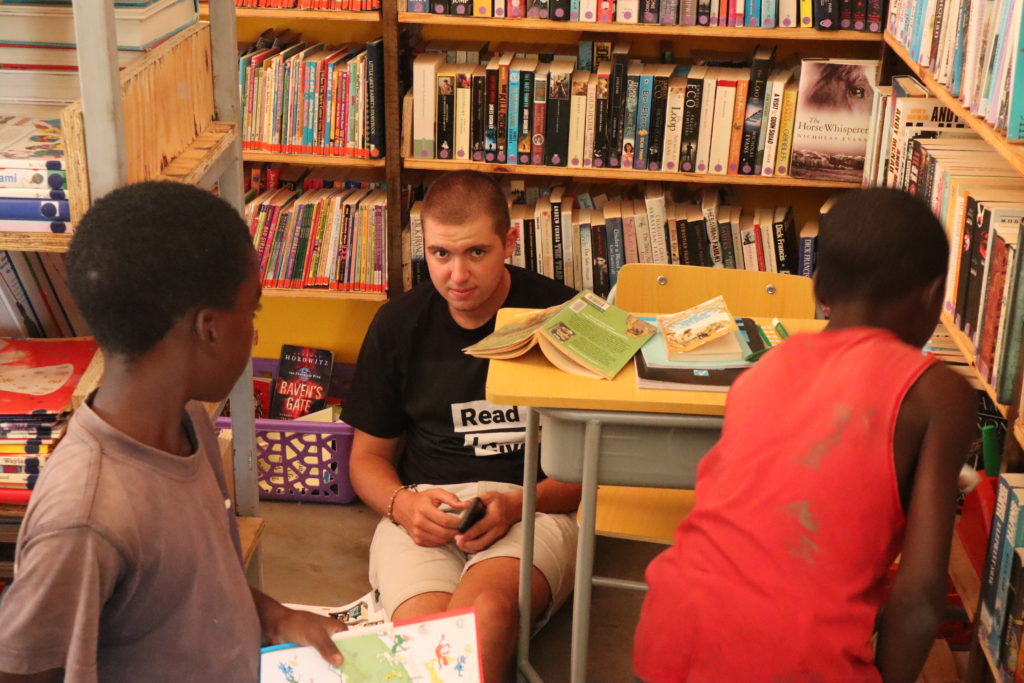
In the future, both Tukongote staff and members of the community expect further benefits. There are plans in place to widen use of the library: an application to ZESCO (Zambia’s national electricity provider) to bring power to the community centre was approved in 2018. When power arrives, the library will be open until 20:00 in the evenings, with a second librarian employed to manage this.
There are three key areas of impact: in classrooms, on professional development, and on the wider community. This report uses evidence gathered through interviews with teachers, students and community members in March 2019. First names signalled in the report refer to those teachers at Tukongote whose feedback we found especially compelling. Each area of impact is considered with B2A’s 3 assessment criteria in mind:
- Quality of Learning
- Quality of Teaching
- Learning Environment
Classroom
Tukongote educates children at the level of Preschool, Primary 1 and Primary 2. Lessons are planned by teachers in accordance with a Tukongote syllabus, adapted from the Zambian national curriculum. The school’s ambitions to improve its teaching quality and eventually extend its teaching to a full primary range were apparent in their wide-ranging use of the B2A donation and engagement with future learning opportunities.
Quality of Teaching and Learning

Teachers indicated their beliefs that the books have had a positive impact on the quality of teaching and learning at the school. They described how the books supported English language learning, and have led to changes in teaching methods and in the classroom. The teachers feel that this has led to an increase in attainment levels amongst students.
The books are central to a defining feature of Tukongote’s approach: immersive English language from the outset. Zambian schools usually teach in Tonga and local languages (commonly Lozi, Nyanja or Bemba) from Primary 1 to Primary 3, then change to all-English teaching from Primary 4. This is a sudden shift for students, who have difficulties adapting and can then struggle to write all-English exams in Primary 7. Instead, Tukongote Community School teaches fully in English from Primary level, so that by P4 (as the school grows) the students know English well enough to focus only on the curriculum, rather than grappling with the language change as well. For older children who use the library, the books provide an opportunity to improve on their English ability.
In the classroom, reading materials have been integrated into the ‘routine of teaching’, according to Agrippa, a literacy and maths teacher. It’s now possible for each pupil to have a copy of the book being studied, particularly in literacy classes. This has helped the teachers improve their method away from rote learning, and towards
a more collaborative approach. Agrippa felt that the books “prevent ‘spoon-feeding’ the students”. Most teachers use the books regularly, both in the classroom and when planning their lessons, discussed in more detail in the ‘Professional Development’ section. Precious, who teaches literacy classes, described the effect created in the classroom by having a variety of books:
“Each and every day we change the book we’re using, because the kids get bored quickly and know if we don’t: they say: ‘Teacher, teacher, we’ve done this already!’”

Beyond the diversity of material now present in classes, the books have added a whole new dimension to learning in the form of the library visit. Each teacher has a set time when they can take their pupils for a visit. Most classes go once or twice a week, but for the more committed classes it can be more; Oscar takes his Primary 2 class to the library three times a
week. The books seem to have had a significant impact on the quality of learning at the school. Every teacher was volubly positive on the impact of the books. Jacob teaches adult literacy, supports community classes and gives targeted support to pupils aiming at secondary schools. He emphasised the place of the library in improving pupil results for older children:
“Before, we had a poor pass rate. Since last year, when we had the books, we managed to have students who had brilliant marks going into secondary school. I think it was the first in our history. Because [before] we never had the resources.”

These benefits should increase over time. First, the relatively short operation period of the library suggests that gains are likely to increase as students and teachers continue to use the resources. Second, there was a sense that some teachers were still getting used to the library system and
teaching resources. As the library becomes more familiar, one would expect the positive impact to grow and produce further results.
Learning Environment

In the same vein, having the books on-site has improved the image of reading in the school, and the wider community. Alongside their direct effect on lessons, teachers testified to the importance of the presence of books, particularly in the disadvantaged school community. Interviewees reflecting on their own school days described scarce and restricted access to books: a locked cabinet filled with sets of textbooks only opened for the teacher to consult a chapter, or just one book per classroom. The wealth of books at Tukongote is used much more openly. In each classroom, the dedicated reading corners provide a place for advanced children to go after finishing their work, and ensure books are prominent around the school. Having the library open to all has changed how books are seen, as Sophia (the supervising community librarian) articulated:
“We are helping the students have a culture of reading, rather than waiting for the teacher to come and read for them. [Children] usually come on their own whenever they have knocked off from school. Like for Stephen [a Primary 2 student], he always comes into the library, and then you can see the spirit that is into him so that by the time he grows up he is going to love most of the books.”

At library hour, the children were excited and animated around the books. The library was full, with children reading both privately and in groups. The books are crucial in the school’s attempts to make reading natural, creating an invaluable environment for children without regular access to books in their homes.
Professional Development
B2A’s shipment included a significant number of textbooks and resources suitable for primary and secondary school students. This breadth has enabled teachers to engage more comprehensively with their educational methods and content in class, as well as allowing them to further their own education (which, in some cases, was curtailed before the final few years of secondary school).
Library resources

Over ¾ of the teachers interviewed regularly use the lesson plan guidance and teaching resources from the library. Some reported using these daily: Edward has scheduled one hour each day from 3pm to focus on preparing material for the following day’s classes. In a few cases, teachers pass on specific pages and sections for Kelly, Tukongote’s school coordinator, to photocopy at the lodge. Teachers repeatedly expressed an improvement in the quality of their teaching and a sense that the new resources were making their jobs easier and more rewarding. As well as remedying a previous absence of teaching preparation, the range of material on offer in the library has inspired teachers in their classroom ambitions. According to Agrippa:
“For each and every person to be a good teacher, they should have a wide knowledge of the subjects that they’re teaching. The library helps us to discover how different authors talk about a certain topic. Teachers should be able to explain a wider variety of information to the pupils.”
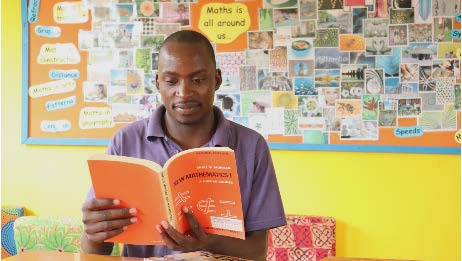
Staff mentioned that when they are not taking classes, they use free time during school for library study in sciences, maths and subjects of personal interest, in addition to research for their classes. One teacher described these pursuits as increasing their “database of knowledge”’; an example of the kind of self-development practice that has flourished since Books2Africa’s donation. Pasco, a wildlife guide at Waterberry Lodge, has also withdrawn a number of books about the local flora and fauna to build his own professional knowledge. The example also illustrates a wider point about the suitability of the donation: Kelly felt that only one box of the 27,000 books would not be useful for the beneficiaries.
Resitting Exams

A specific use of the library since its installation in mid-2018 has been to enable exam-targeted learning and preparation amongst Tukongote’s teaching staff. Many of the teachers we spoke to are taking or retaking multiple Primary 12 and 13 exams (their final two years), and are now able to find the relevant textbooks to revise from in the library’s catalogue.
These new ambitions have impacted not just Tukongote’s staff but teachers from surrounding schools too, including the local government primary school and Big Tree community school. When we visited, a group-led Biology revision session was taking place after school with Laurence – a teacher at Big Tree – and three staff from Tukongote working and learning collaboratively. Even those teachers who have diploma qualifications expressed their intentions to study further. Oscar, who led the Biology revision session, was positive about the breadth of science textbooks available to him and has set himself the target of a bachelor’s degree in science. For Parity, a Primary 2 teacher at Tukongote, the library is not just a welcome resource for his lessons but has become a larger motivating factor in his future:
“I’ve just developed that desire of finding myself in the library all the time, because I’m like, ‘I missed this opportunity, now it’s my time to use it. At least I’ve been given another chance to have this thing which I didn’t have in my past’. I don’t just use the library for my lesson preparation but I use the library for my future, for my children because what I’m doing now is for my life as well.”

Community
The impact of the books has gone beyond Tukongote School. Access to resources for the local community has had a powerful effect. The books at Tukongote are permanently available to members of the surrounding villages, and trusted readers are allowed to take out books for the evenings. Pupils attending other schools in the community have made use of the resources. Overcrowding in Zambian schools means many pupils learn in half-day shifts, and pupils who have free mornings voluntarily come to the library to read, and for supplementary classes. Going to the library is a major part of the children’s day, and their excitement is appreciated by teachers at Tukongote, such as Edward:
“The effect is so great, especially for the kids who are from the villages. Like you saw, they will come in and read books. Sometimes they can’t read but they will open pages and see pictures, and just get excited to have this place.”

The benefits of Books2Africa’s donation have spread from Tukongote to other schools in the local area. At Kazangula Secondary School, Books2Africa’s textbooks (forwarded by Tukongote) were pride of the library and a second local high school received 12 boxes of books. For the school, the community, and surrounding areas, this donation has been incredibly useful.
Within the adult community, engagement with the library is increasing and, as the reading environment develops, the impact will only increase. Adult literacy classes, which run in the evenings, are an important use for books outside the primary school. Each adult learner now has access to a copy of the book being read. In addition, Sophie emphasised how the library has brought variety to village life and was providing a new source of leisure. Teachers commented on how the community has embraced the books; Oscar is optimistic for further impact:
“Now you are seeing parents from all round the community coming to read. It has really helped the local villages, and those that are still doubting will see their neighbours and will come! The community has opened up to it.”

With the arrival of electricity, the opportunities for the wider adult community will be broadened. Many adults are currently unable to visit the library due to work commitments, but Tukongote Community Project have planned a later library closing time of 20:00 and evening classes. The variety of the books has also been praised: Kelly, the project coordinator, used to work for a mobile library and has travelled all over Zambia. She testifies that it is the best library she’s seen in the country, a perspective corroborated by the local English-speaking community in Livingstone, some of whom have visited the library to access the quality of its catalogue!
Conclusion
Tukongote Community Project is a strong example of the benefits that can be derived from free and frequent access to books. In early 2018, Books2Africa delivered 27,000 books to the project, and in June of the same year a community library was opened. The impact has been pronounced. Reading materials now available in the community library and the classroom reading corners have become a central part of the children’s learning and their enjoyment of school. Teachers repeatedly associated their improved performance at primary level with the presence of these books in the community.
Teachers were also benefiting from the shipment of books, increasingly engaging with teaching resources, while daily timetables now include both structured library time and unstructured reading in classroom ‘reading corners’. The books have sparked professional self-development and a growing contingent of teachers now use textbooks to support their study groups, working towards resitting exams and further qualifications.
The success of this donation was maximised by the excellent work of the Tukongote Community Project, who have created a clean, safe and open environment for the books to be used. Their work has augmented the impact of the books: efficient and effective operation of the primary school, distribution of excess books to other local schools, coordination of adult literacy classes for adults, and further study classes for primary and secondary school students. The importance of beneficiary selection is one of the main lessons to be taken from this case study. Books2Africa receives a large number of requests to provide assistance from limited resources, and, as Tukongote Community Project exemplifies, their selection process is vital to the scale of impact that their donation can bring about.
Finally, there was a strong sentiment throughout the interviews conducted that the presence of books had had a transformative impact on the broader community. Adults were coming to improve their English language ability, teachers were reading fiction from the adult sections, and children used the library as both a play and study area outside of school hours. The joy of
reading and the pursuit of knowledge are being ignited in the area. Edward captured this sentiment powerfully:
“The impact is definitely there, and parents are being challenged by kids! There’s a desire and zeal to go back to school, something has taken place in people’s hearts. Someone would now come from the village and read just for pleasure.”

Teachers and adults in the community were excited at the potential for further impact, as the community becomes more familiar with the available resources, and the library opens in the evenings. By the end of our visit we were convinced that the Tukongote Community Project is having a significant impact on the surrounding villages, and that Books2Africa’s largest ever donation of books is of central importance.
